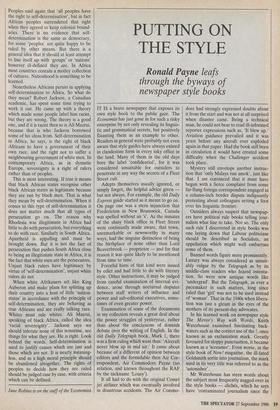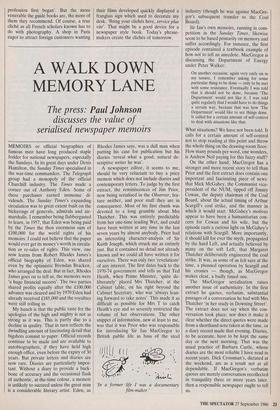PUTTING ON THE STYLE
Ronald Payne leafs
through the byways of newspaper style books
IT IS a brave newspaper that exposes its own style book to the public gaze. The Economist has just gone in for such a risky enterprise by not only revealing its linguis- tic and grammatical secrets, but positively flaunting them as an example to other. Readers in general were probably not even aware that style guides have always existed in clandestine form in every inky office in the land. Many of them in the old days bore the label 'confidential', for it was considered unsuitable for outsiders to penetrate in any way the secrets of a Fleet Street cult.
Adepts themselves usually ignored, or simply forgot, the helpful advice given but not always. For example, the old Daily Express guide started as it meant to go on. On page one was a stern injunction that Fredericton in New Brunswick, Canada was spelled without an 's'. As the inmates of the shiny black office in Fleet Street were continually made aware, that town, unremarkable or newsworthy in many ways, had the singular distinction of being the birthplace of none other than Lord Beaverbrook — proprietor — and for that reason it was quite likely to be mentioned from time to time.
Forceful hints of that kind were issued by edict and had little to do with literary style. Other instructions, it may be judged from careful examination of internal evi- dence, arose through nocturnal disputes between staff writers of influence and power and sub-editorial executives, some- times of even greater power.
Examination of some of the documents in my collection reveals a great deal about the power struggles of yesteryear, rather than about the conclusions of donnish debate over the writing of English. In the old Daily Telegraph book, Mark 1, there was a firm ruling which went thus: 'Aircraft never blow up in mid air.' It came about because of a different of opinion between editors and the formidable then Air Cor- respondent, Air Commodore Payne (no relation, and known throughout the RAF by the nickname 'Lousy).
It all had to do with the original Comet jet airliner which was eventually involved in disastrous accidents. The Air Commo- dore had strongly expressed doubts about it from the start and was not at all surprised when disaster came. Being a technical man, he could not bear to read ill-informed reporter expressions such as, 'It blew up.' Aviation guidance prevailed and it was years before any aircraft ever exploded again in that paper. Had the book still been in circulation it would have created some difficulty when the Challenger accident took place.
Mystery still envelops another instruc- tion that 'only Malays run amok', just like that. I am convinced that it must have begun with a fierce complaint from some far-flung foreign correspondent engaged in a column-inch border dispute indignantly protesting about colleagues setting a foot over his linguistic frontier.
Outsiders always suspect that newspap- ers have political rule books telling jour- nalists what line to take. Not, so. The only such rule I discovered in style books was one laying down that Labour politicians should be described as Socialists, an appellation which might well embarrass some of them.
Banned words figure more prominently. Luxury was always considered as unsuit- ably vulgar by the Telegraph as by its middle-class readers who feared ostenta- tion. So were now antique words like `undergrad'. But the Telegraph, as ever a pacemaker in such matters, long since ruled that 'girl' was not to be used instead of 'woman'. That in the 1940s when libera- tion was just a gleam in the eyes of the mothers of its present-day advocates.
In his learned work on newspaper style The Mirror's Way with Words, Keith Waterhouse examined fascinating back- waters such as the correct use of the !, once known as an exclamation mark. Greatly favoured for sloppy punctuation, it became known as a 'screamer'. Even worse, in the style book of Now! magazine, the ill-fated Goldsmith sortie into journalism, the mark used in its very title was referred to as the `astonisher'.
Mr Waterhouse has stern words about the subject most frequently nagged over in the style books — cliches, which he says have 'contaminated journalism since the profession first began'. But the more venerable the guide books are, the more of them they recommend. Of course, a true cliché as all French scholars known has to do with photography. A shop in Paris eager to attract foreign customers wanting their films developed quickly displayed a franglais sign which used to decorate my desk. 'Bring your clichés here, service plus vile'. That might be a good device for a newspaper style book. Today's phrase- makers create the clichés of tomorrow.



























































 Previous page
Previous page